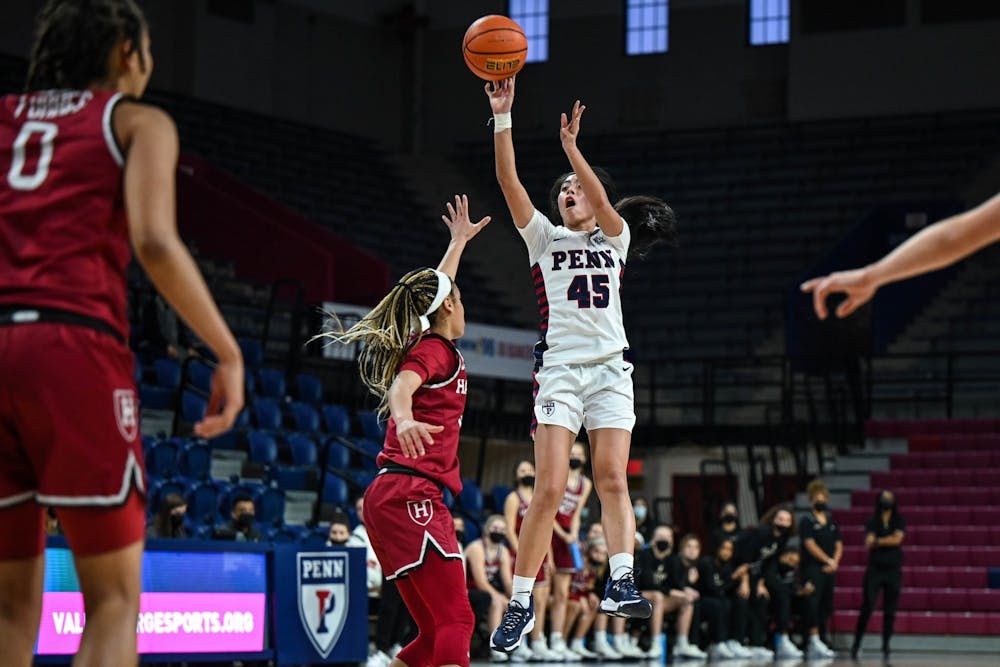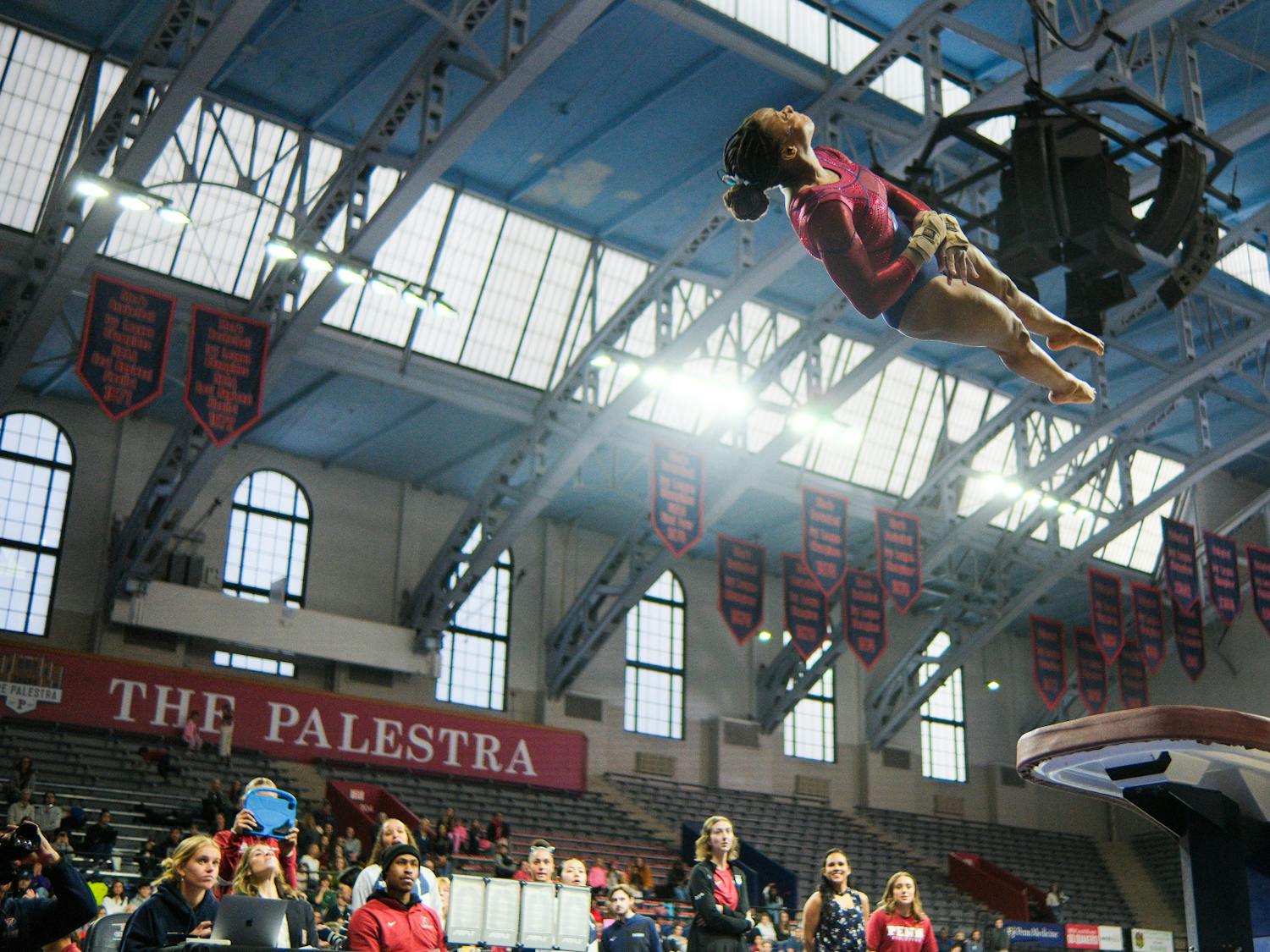Kayla Padilla, now a senior, has already been carving her name into Penn basketball history. As a two-time first team All-Ivy player and one of Penn’s most prolific three-point shooters, it’s almost like basketball runs in her blood.
In many ways, it does.
Padilla is a second-generation Filipino American. Filipinos are historically huge basketball fans, with basketball jersey shops lining the streets of their most populous cities and basketball hoops of all kinds standing throughout the island nation. The basketball court of Fort Bonifaco Tenement in Taguig City, Philippines, is considered sacred ground in the sport.
“It’s so embedded in the culture,” Padilla said. Most of her family also grew up playing basketball, but she’s been the first among her family to make it to the collegiate level.
“I feel there’s a common love for the sport. It was hard not to catch onto that growing up, especially being also surrounded by a lot of Filipinos where I’m from.”
Padilla hails from Torrance, Calif., located 18 miles south of the Crypto.com Arena, home of the NBA's Los Angeles Lakers and Clippers. When Padilla was growing up, it was in the then-Staples Center where Lakers basketball dominated, with the late Kobe Bryant and Shaquille O’Neal claiming five championships in 10 seasons. Growing up in Los Angeles at the height of purple and gold dominance fostered Padilla’s love for basketball.
And as an Asian American girl, Padilla wasn’t an outlier on the court. Within her diverse community, there were numerous other Asian American girls who also played basketball, enough so that she played in multiple Asian basketball leagues.

Senior Kayla Padilla poses in her basketball uniform as a child (Photo Courtesy of Kayla Padilla).
Today, Padilla is the lone Asian American player on the Penn women’s basketball team, which has been the case throughout her time at Penn.
“[Being on the team] brings about an awareness and education that we need to start taking more consideration into things, like Filipino American Heritage Month and Asian American Pacific Islander Month; bringing that awareness not only to the team but also to Penn’s campus,” Padilla said. The FAHM and AAPI months are celebrated in October and May, respectively.
Padilla hopes that through this exposure and awareness, strides could be made for Filipinos — and people of Asian heritage in general — to play sports beyond high school and make it to the collegiate or even professional level.
Right now, it’s an uphill battle.
According to NCAA 2021 data, only 2% of NCAA Division I athletes identified as Asian — 9,821 student-athletes out of 493,297. Furthermore, there were only 30 women of Asian heritage playing DI basketball in 2021.
The statistics don’t improve with professional sports. In the NBA, only 0.2% of players reported identifying as Asian in the 2021-2022 season. The WNBA proves even fewer players of Asian heritage on its team rosters. In the 2021 season, there were only two Asian American players reported. Neither had played due to opting out because of COVID-19.
Additionally, a Filipina woman has yet to see playing time in the WNBA. Chanelle Molina is the first to come close. After going undrafted, she signed a training camp contract with the Indiana Fever before being waived due to injury. Similarly, Kai Sotto was on the cusp of making history as the first-ever Filipino-born athlete to make it to the NBA this past summer, but fell short after going undrafted and unsigned.
There are barriers to be broken still, and Padilla is doing her part by trying to bring awareness to the journeys of Filipino American and Asian American athletes, not just on the court, but off it, too.

Senior Kayla Padilla playing basketball as a child (Photo Courtesy of Kayla Padilla).
In June of 2021, the NCAA changed its longstanding stance on athletes profiting off their names. Players became allowed to engage in branding opportunities concerning their name, image, and likeness. Padilla immediately jumped on the opportunity.
She partnered with her trainer of a decade — Jared Lloyd, co-founder of Homecourt Edge — to create her own merchandise line. The logo is minimalistic in design but features elements of the Filipino flag and heritage.
“From the start, I knew I had to incorporate Filipino culture in some sort of way,” Padilla said. “I’m so cognizant that I’m not in the position I am today without everything that being a Filipino has brought me and enabled me to be in the position I am today.”
Her merch design features the blue and red that make up most of the Filipino flag — not too far off from the color scheme that Padilla dons for Penn. It also includes the Filipino sun from the flag that is frequently used in Filipino branding. Manny Pacquiao — a famed Filipino boxer that had a brief stint in professional basketball — incorporates the sun and blue and red color scheme into his logo.
And while having her own merch line and being a brand ambassador has been a fulfilling experience, Padilla says that more of the excitement and appreciation comes from her supporters who proudly wear her gear.
In November 2021, Padilla returned to Los Angeles to play with the Quakers in the Loyola Marymount Thanksgiving Classic. Her homecoming, which included her breaking the program record of most three-pointers in one game with nine total made, was well-received by the community. Half the crowd donned Padilla’s merch, a unifying display of support for her and her career.
“Just having that come into fruition and seeing the amount of people willing to support me in that kind of capacity, it’s kind of affirming that what I was doing and what I was representing was right and meant something to people,” Padilla said.

Among her biggest supporters are her family. Being across the country from them has been a challenge, but maintaining strong connections with her family has always been an immense priority. Family comes first, and not just because her grandmother makes, in Padilla’s opinion, the best version of pork sinigang, her favorite Filipino food.
Padilla also sources the value of hard work from family as well. She admires her grandparents, who all had made the tumultuous journey from the Philippines to the United States in search of opportunities.
“That level of hard work and determination to get to the places you want to be has been a very common thread through family, and I think it translates to my time here at Penn, whether that be on the court or in the classroom or in the broader community,” Padilla said.
With support from family and community, and a personal work ethic sourced from those she finds most important, Padilla is finding the strength to shine more light on athletes of Asian heritage and share how much Filipinos love the game.
“I think I’ve made the most of the opportunity to show people that there are Filipinos that can be in this space and play at this level. And I’m hoping it can be leveraged to be a good role model for people who want to be in the same position as I am.”








